A suffix (in contrast to a prefix—although both are forms of affixes) are word parts that attach to the beginning or end of a word or base word (the simplest form of the word). They are used to produce a related word or an inflectional form of the word. For example, “reporting” and “porting.”
What is a suffix?
Suffixes are sequences of letters that are appended to the ends of words in order to modify and change their meanings.
By appending the suffix -ing to the verb ‘speak,’ for instance, we can get the present tense form ‘talking.’
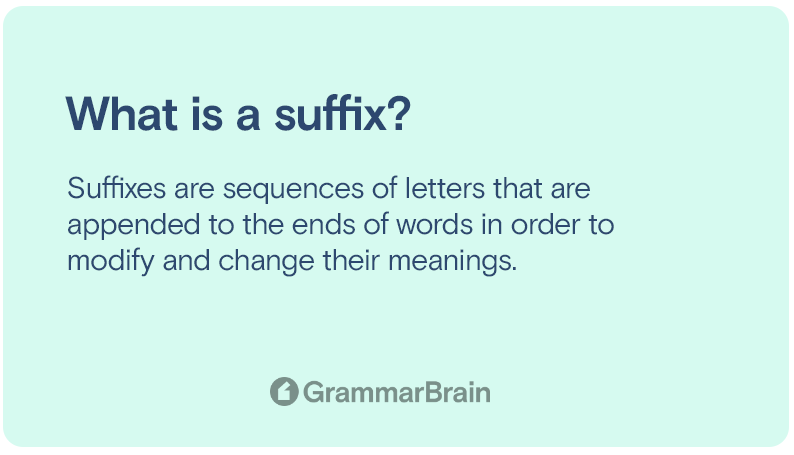
Suffix definition
A suffix is a series of letters that is added to the end of a root word and modifies or expands the meaning of the original word.
Suffixes can also be used in English to show if a word is a noun, verb, adjective, or adverb.
Difference between a prefix and a suffix
A prefix is a letter or group of letters that is attached to the beginning of a word. Having said that, it completely alters the definition of the word. On the other hand, the term “suffix” refers to a group of letters that is added to the end of a word.
As an illustration:
The prefix “im” affects the meaning of the word “patient” and appears in this context at the beginning of the word. Patient is synonymous with patience, while impatient conveys the opposite connotation of that word.
On the other hand, the word “painful” is formed by adding the suffix “ful” to the beginning of the word, which results in a new meaning. In addition, the meaning of the word shifts when a suffix is added. “Pain” is a noun, and “painful” is an adjective.
Nevertheless, prefixes and suffixes are both considered to be elements of affixes. The meaning of the base word, also known as the root word, can be altered by using one of these affixes.
A quick look reveals the following differences between a prefix and a suffix:
- A root word’s prefix is any set of letters that appears before the root word itself. A suffix, on the other hand, is a collection of letters that are appended to the end of a basic word.
- The prefix appears first in any word, and the suffix is always inserted at the very end.
- A prefix can alter the meaning, and a suffix can likewise modify the meaning; besides, they can help format tenses.
- In contrast, there is only one kind of prefix, but there are two kinds of suffixes: inflectional and derivational.
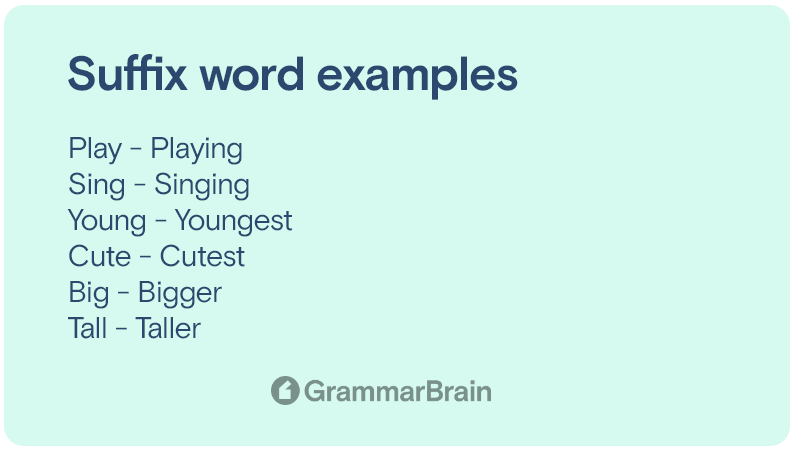
Why are suffixes used?
The best strategy to increase your vocabulary is to become familiar with various suffixes. Suffixes are typically added to the end of words to change or expand their meaning.
A suffix is an additional word that is added to the end of a root word in order to create new words. A root word is an autonomous word that may be used on its own.
Take, for example:
- Play – Playing
- Sing – Singing
- Young – Youngest
- Cute – Cutest
- Big – Bigger
- Tall – Taller
A word’s suffix can also indicate how it will be employed in a sentence. It can also indicate whether or not the word is a noun, verb, adverb, or adjective.
When appended to the end of a root word, certain suffixes allow for the spelling of the root word to remain unchanged.
What are the grammar rules that govern suffixes?
The English language places a strong emphasis on the use of suffixes.
They are put to use in the creation of new words as well as in the modification of the meanings of existing terms. There are two types of suffixes: vowel suffixes and consonant suffixes.
The following is a list of rules governing suffixes in grammar:
1. Double the amount of the consonant
When adding suffixes to some base words that end with a consonant, it is necessary to double the last letter. However, this requirement is only applicable in specific circumstances.
Examples:
- Fat – Fatter
- Cool – Cooler
- Hot – Hotter
- Run – Running
- Call – Calling
- Write – Writing
- Flip – Flipped
- Clip – Clipped
- Pamper – Pampered
- Partner – Partnered
- Fumble – Fumbling
2. Get rid of the silent E
The rule that dictates whether a word’s last silent “e” should be dropped or not depends on the letter that comes first in the suffix. This is true whether it’s a vowel or a consonant.
Examples:
- Give – Giving
- Dine – Dining
- Make – Making
- Debate – Debatable
- Excite – Exciting
- Vote – Voting
- Love – Lovable
3. Maintain the Final E
When adding a suffix to a word, there are a few instances in which the final “e” of the word remains intact.
Examples:
- Courage – Courageous
- Advantage – Advantageous
4. Don’t forget the Y
When attaching a suffix, there are a few instances in which the letter “y” must be maintained at the end of the word.
Examples:
- Destroy – Destroyed
- Bray – Brayed
- Betray – Betrayal
- Convey – Conveyed
5. Replace the Y in the phrase with an I
In order to add a suffix, it is sometimes necessary to alter the letter “y” that is found at the end of the word to the letter “i.”
Examples:
- Copy – Copied
- Cry – Cried
- Deny – Denied
6. Replace IE with Y
When you add the suffix -ing to a word that ends in “ie,” modify the ending of the word so that it ends in “y.”
Examples:
- Lie – Lying
- Die – Dying
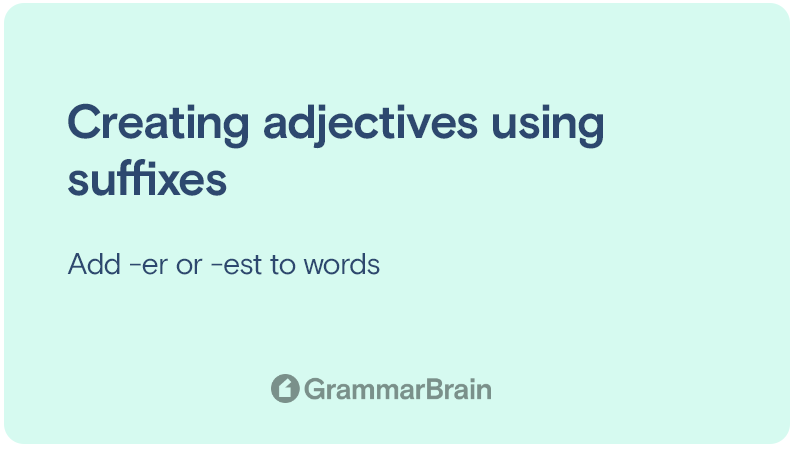
Suffix (list)
-ness refers to a quality in its present situation.
- Happy – Happiness
Example: James believed that happiness was the biggest gift he could give himself.
-ment refers to an action or the consequence of
- Excite – Excitement
Example: Selena could not contain her excitement when she opened her present.
-er, which stands for someone who acts as an actor
- Dance – Dancer
Example: The dancer arrived two hours early at the venue.
-ion, which stands for the process of
- Perfect – Perfection
Example: Selena always looked for perfection, no matter what she did.
-ship, which stands for a position maintained
- Hard – Hardship
Example: James has faced a lot of hardship in his life.
More suffix words and meanings:
| Suffix | Meaning | Noun suffix |
| -al | Condition, quality | Dismissal, proposal, arrival, approval |
| -ance/-ence | Action, state, condition, quality | Acceptance, attendance, insurance, existence |
| -sion | State or being | Revision, division, profession |
| -ure | Action or the resulting state | Erasure, failure, pressure, legislature |
| -age | Action, state, process | Postage, package, baggage, marriage |
| -ing | Action, state, process | Landing, writing, ending |
| -ery | A business or trade in behavior | Bakery, creamery, machinery, slavery |
| -eer | Engaging in something | Volunteer, engineer, musketeer |
| -er | Someone who performs an action | Teacher, dancer, helper |
| -ist | Person who practices | Cartoonist, columnist, bicyclist |
| -ity | State or condition of | Equality, abnormality, probability |
| -ment | The action or result of | Retirement, establishment, movement |
| -ness | A state or quality | Awareness, kindness, darkness |
| -or | A person who is something | Translator, investigator |
| -ship | Position held | Courtship, internship, worship |
| -th | State or quality | Warmth, death, strength |
| -ty | Condition | Honesty, difficulty, safety |
| -hoop | Family terms | Parenthood, motherhood |
Adjective suffixes (list)
-able means “capable of being”
- Comfort – Comfortable
Example: James lived in a comfortable apartment with his brother.
-ary means “of” or “related to”
- Revolution – Revolutionary
Example: The new Android technology is truly revolutionary.
-ful means “full of”
- Joy – Joyful
Example: James has a very joyful puppy.
-ious means “having characteristics of”
- Luxury – Luxurious
Example: James bought a luxurious robe for his girlfriend.
-ive means “having the quality or character of”
- Excess – Excessive
Example: Selena is sick because she had an excessive amount of chocolates last night.
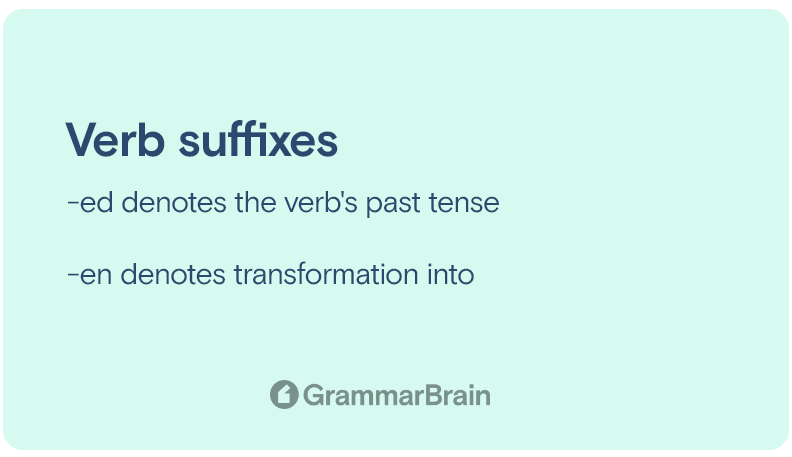
Verb suffixes (list)
-ed denotes the verb’s past tense.
- Talk – Talked
Example: Selena talked to all the people at the party.
-en denotes transformation into.
- Wood – Wooden
Example: Selena started using a wooden spoon to be more environment friendly.
-ing is the present tense of most verbs.
- Climb – Climbing
Example: The monkey started climbing the pole this morning.
More verb suffix words:
| Suffix | Meaning | Verb Suffixes |
| -er | Action or process, making an adjective comparative | Longer, bigger, fuller, faster |
| -ing | Verb form/present participle of an action | Swimming, laughing, writing |
| -ize, -ise | To cause or to become | Spealize, authorize, socialize |
| -ify, -fy | To make or produce | Classify, satisfy, simplify |
| -ate | To make | Accomodate, activate, animate |
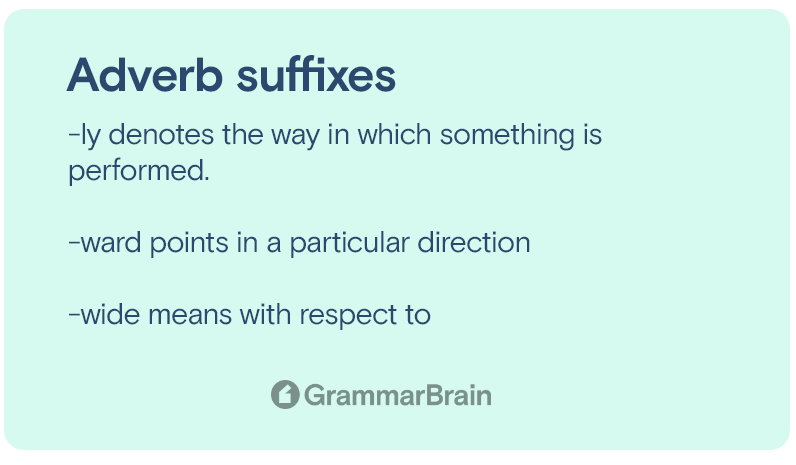
Adverb suffixes (list)
-ly denotes the way in which something is performed.
- Frequent – Frequently
Example: James frequently visits the new coffee shop.
-ward points in a particular direction
- Back – Backward
Example: The puppy kept walking backward because it was scared.
-wide means with respect to
- World – Worldwide
Example: Justin Bieber became popular worldwide because of his music.
More adverb suffix words:
| Suffix | Meaning | Adverb Suffix |
| -ly | In the manner something is being done | Bravely, simply, honestly |
| -ward | In a certain direction | Backward, wayward, awkward |
| -wise | In relation to | Clockwise, edgewise, lengthwise |
How to use a suffix
The addition of a suffix to the end of a word will alter what that word means when used in context.
The shift is not particularly obvious. A suffix will not transform a word into its antithesis or add another facet of meaning to it; rather, it will change the category that a word belongs to.
FAQs
What is the suffix that means “origin is?”
The suffix that means ‘origin is’ is ‘ish.’
For example:
- Fool – Foolish
What does “suffix” mean on an application form?
What is a combining form?
A combining form is a word that only appears as part of another word. For example, “-wise” in clockwise. Combining forms are similar to affixes but have more lexical substance.
What is the derived forms of suffixes?
Inflectional suffixes don’t change the word class of the word after the inflection.
Derivational suffixes can get divided into two categories: class-changing derivation and class-maintaining derivation.
Is suffix a word class?
The word suffix is can be defined as adding a portion of a word to form a different word from its original meaning. The original meaning comes from New Latin Suffixium.
Sources:
- What is a Suffix?
- What are the Differences between Prefix and Suffix?
- What are Prefixes and Suffixes? Definition, Examples
- Difference Between Suffix and Prefix
- What Are Suffixes? (with Examples)
- What are suffixes?
- Suffix Spelling Rules: 6 Keys for Adding Suffixes Correctly
- What Is a Suffix—and How Should You Use One?
- List of Suffixes: 30 Must-Know Suffix Examples
- Learn How to Use Prefixes and Suffixes
- List of Suffix: 50+ Most Common Suffixes with Meaning and Examples
Inside this article
Fact checked:
Content is rigorously reviewed by a team of qualified and experienced fact checkers. Fact checkers review articles for factual accuracy, relevance, and timeliness. Learn more.
Core lessons
Glossary
- Abstract Noun
- Accusative Case
- Anecdote
- Antonym
- Active Sentence
- Adverb
- Adjective
- Allegory
- Alliteration
- Adjective Clause
- Adjective Phrase
- Ampersand
- Anastrophe
- Adverbial Clause
- Appositive Phrase
- Clause
- Compound Adjective
- Complex Sentence
- Compound Words
- Compound Predicate
- Common Noun
- Comparative Adjective
- Comparative and Superlative
- Compound Noun
- Compound Subject
- Compound Sentence
- Copular Verb
- Collective Noun
- Colloquialism
- Conciseness
- Consonance
- Conditional
- Concrete Noun
- Conjunction
- Conjugation
- Conditional Sentence
- Comma Splice
- Correlative Conjunction
- Coordinating Conjunction
- Coordinate Adjective
- Cumulative Adjective
- Dative Case
- Determiner
- Declarative Sentence
- Declarative Statement
- Direct Object Pronoun
- Direct Object
- Diction
- Diphthong
- Dangling Modifier
- Demonstrative Pronoun
- Demonstrative Adjective
- Direct Characterization
- Definite Article
- Doublespeak
- False Dilemma Fallacy
- Future Perfect Progressive
- Future Simple
- Future Perfect Continuous
- Future Perfect
- First Conditional
- Irregular Adjective
- Irregular Verb
- Imperative Sentence
- Indefinite Article
- Intransitive Verb
- Introductory Phrase
- Indefinite Pronoun
- Indirect Characterization
- Interrogative Sentence
- Intensive Pronoun
- Inanimate Object
- Indefinite Tense
- Infinitive Phrase
- Interjection
- Intensifier
- Infinitive
- Indicative Mood
- Participle
- Parallelism
- Prepositional Phrase
- Past Simple Tense
- Past Continuous Tense
- Past Perfect Tense
- Past Progressive Tense
- Present Simple Tense
- Present Perfect Tense
- Personal Pronoun
- Personification
- Persuasive Writing
- Parallel Structure
- Phrasal Verb
- Predicate Adjective
- Predicate Nominative
- Phonetic Language
- Plural Noun
- Punctuation
- Punctuation Marks
- Preposition
- Preposition of Place
- Parts of Speech
- Possessive Adjective
- Possessive Determiner
- Possessive Case
- Possessive Noun
- Proper Adjective
- Proper Noun
- Present Participle
- Prefix
- Predicate



